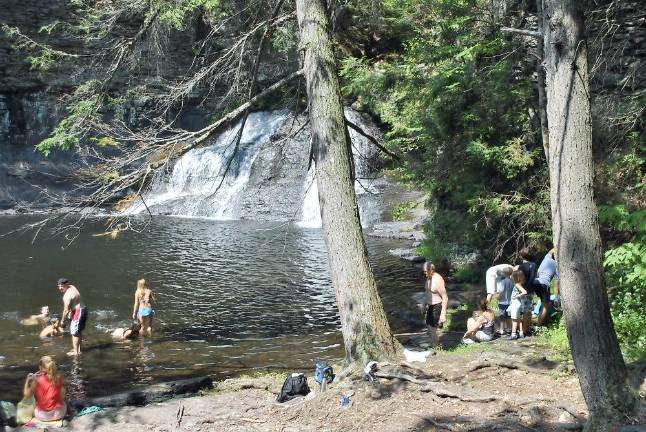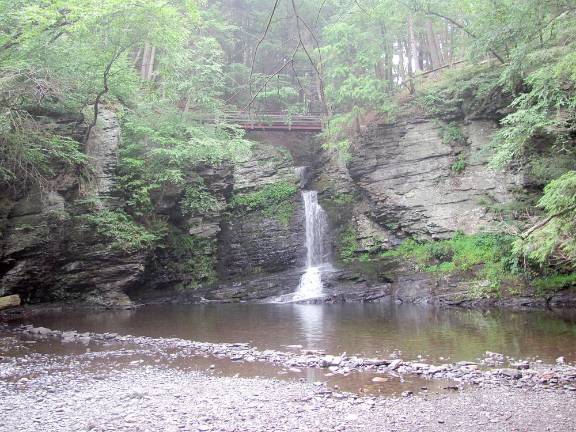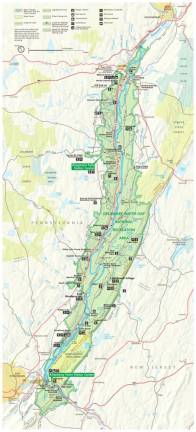Pay to play? NPS says fees will protect park's stunning landscape from wreckage
Bushkill. The National Park Service is proposing axing amenity fees at Delaware Water Gap National Recreation Area in favor of a park entrance fee that it says will avoid abuse of its natural resources. The Sierra Club says the fee will discourage low-income families from using the park.



Axing amenity fees in favor of a park entrance fee is one way the National Park Service proposes to help Delaware Water Gap National Recreation Area visitors have more fun and avoid wrecking the park's stunning natural resources.
Instead of selecting a site in line with what they’d like to do, some visitors choose a spot without amenity fees, park officials say. Adopting a park-wide entrance fee would discourage this behavior, the NPS said in its Visitor Use Management Plan.
Kathleen Sandt, public affairs specialist for the NPS, said the mismatching between location and activity is damaging the park.
“(They’re) swimming in places that are not designed for that, making river accesses in areas where there previously was no river access, they’re trampling vegetation, they’re causing lots of erosion,” she said. “There are some areas along the river where all of the vegetation is now gone because so many people have tried to picnic and swim and recreate in those areas.”
The Federal Lands Recreation Enhancement Act he legislation that allows the NPS to collect revenue as long as it is used to enhance the visitor experience. Of the 419 units in the park service, Sandt said, roughly a quarter charge an entrance fee. She said fees in the Delaware Water Gap National Recreation Area would be used for both restoration and development.
“In many cases it’s to restore that damage to natural conditions, but in some areas we’re actually looking to increase or develop or add the things that people need,” Sandt said. “The amount of trash and human waste that people can leave behind after a day of picnicking in an area that’s not designed for that can be overwhelming and can cause a health and safety issue.”
She said at least 80 percent of the fee money stays in the park where it is collected, and the other 20 percent benefits parks that do not collect fees. Entrance fees are set by the NPS, not the local park, Sandt said.
The proposed fees for a seven-day pass for the Delaware Water Gap National Recreation Area would be $25 per car, $20 per motorcycle, and $15 per person, or $45 for an annual pass. There is no day pass option. Sandt said seven-day passes are standard for the park service.
“A seven-day pass does give the person paying that fee the biggest bang for their buck, the most out of their money that they can get,” she said.
She also said that, while the recreation area is frequently used by locals and day trippers within driving distance, that isn’t always the case.
“We get a lot of people that come and backpack on the Appalachian Trail, or they’re doing three-day river trips, or camping in the area and visiting numerous different attractions,” Sandt said. “We also have people that come and stay in the Poconos and then take day trips out to the park. We do get multiple-day visitors.”
In 2006, the NPS established an entrance fee structure across parks of similar types. The pricing structure was updated in 2014 and, most recently, in 2018.
“There had been a proposal (in 2018) to raise the fees substantially, in some cases, in some parks, the entrance fees had doubled,” Sandt said. “They were talking about raising some of the fees to $70. That went out for public comment, and the public commented loudly and often and, in the end, the entrance fees were changed only $5 across the board.”
Parks will fully incorporate the entrance fees by Jan. 1, 2020.
Sierra Club calls fees 'concerning'
Calling the proposed fees “concerning,” the Pennsylvania chapter of the Sierra Club sent out an action alert to its members to make them aware of the plan’s proposals.
The fees would discourage some people from being allowed to readily access the recreation area, especially low-income families, the Pennsylvania chapter said.
“These added fees are a financial burden that inhibit recreational access rather than expand it,” the chapter said.
The NPS is a federal agency within the Department of Interior. Delaware Water Gap National Recreation Area is one of the top 25 most-visited NPS units, with 3.2 million visits in 2018.
“(An entrance fee) would give people better recreational opportunities, it would give them access to areas, more things to do, better things to do,” Sandt said. “In order to do that, we have to be able to pay for those things.”
“The amount of trash and human waste that people can leave behind after a day of picnicking in an area that’s not designed for that can be overwhelming and can cause a health and safety issue.” -- Kathleen Sandt, NPS public affairs specialist